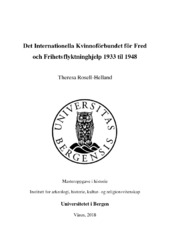| dc.description.abstract | This master thesis has its focus on “Internationella Kvinnoförbundet för Fred och Frihet” (IKFF), the Swedish section of the transnational organization “Woman’s International League for Peace and Freedom” (WILPF), which provided refugee relief in the period between 1933 and 1948. The main issue this master thesis attempts to explore, is: Why did IKFF choose to help refugees during the years from 1933 to 1948, and what were the actions taken? What were the crucial factors that contributed to IKFF’s accomplishments within refugee aid, who were the key players and what significance did they have for the humanitarian aid? The key players in IKFF’s refugee aid have proven to be of great importance to what the Swedish section accomplished in its refugee aid and which extent the refugee aid gained. This was partly due to several of the key players being part of a woman’s network covering several Swedish women’s organizations. When WILPF in 1933 decided that the transnational organization should engage in refugee aid, IKFF used this network to recruit new members who could contribute to the work. This network also enabled IKFF to collaborate with several woman’s organizations, domestic and abroad, in its refugee aid. IKFF acted in different ways to help refugees. The number of refugees who applied to Sweden was restricted until 1938, and as a result of this, IKFF focused helping refugees residing in other countries during the first few years. In this case, IKFF operated mainly as a contributor in various relief operations initiated by foreign organizations. In 1938, the number of refugees to Sweden increased. This led IKFF, in collaboration with other Swedish organizations, to try to influence Swedish authorities to grant quotas for different groups of refugees. One of the preconditions for the Swedish authorities to agree to grant refugee quotas was that organizations like IKFF would finance refugee stays in Sweden. IKFF therefore started to work on finding foster homes and establish an orphanage for refugee children, as well as finding homes for other refugees. IKFF believed that more refugees could be helped if the Swedish government liberalized its immigration and refugee policies and changed the right of asylum to include Jewish refugees. The organization therefore initiated work to influence the Swedish government so that it would liberalize its refugee policy. They collaborated with several other organizations in Sweden to create understanding and acceptance in the opinion of refugee aid which could in turn affect the government’s view of the matter. In order to strengthen public opinion on refugee aid in the country and to get more people to engage in refugee aid, IKFF worked to convey and preach information about the dangers of Nazism, fascism and anti-Semitic attitudes. | en_US |
